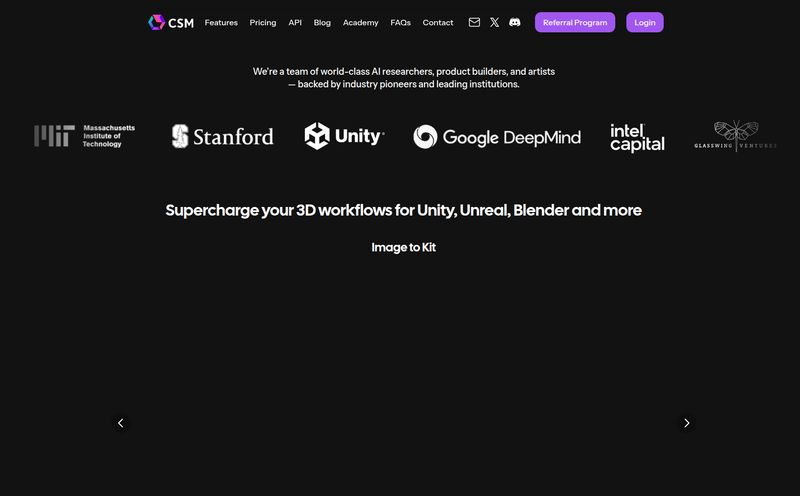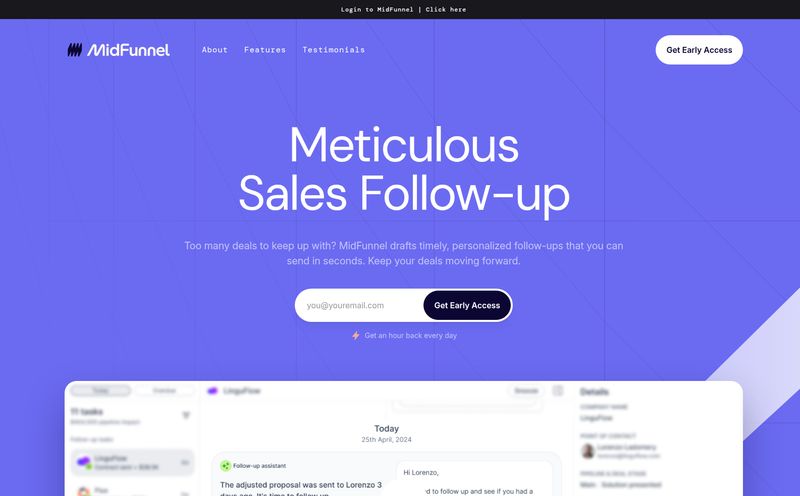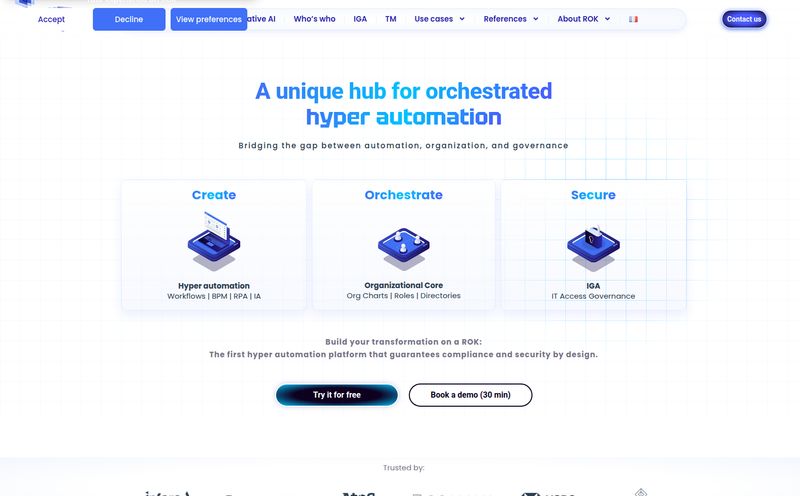We've all been there. It's 2 AM, fueled by questionable coffee, and you're staring at a bug that makes absolutely no sense. You've been hunting it for hours. Your code, once a beautiful expression of logic, now looks like a bowl of spaghetti thrown at the wall. The deadline is looming. You start questioning your life choices. Fun times.
In the last couple of years, AI coding assistants have flooded the market, all promising to be the cure for this exact pain. They're everywhere, from GitHub Copilot to a dozen other tools, all claiming they'll write perfect code for you. But I've always been a bit skeptical. A lot of them feel like fancy autocompletes that are great at generating boilerplate but fall flat when things get tricky. They don’t really understand your code; they just predict the next token.
So when I stumbled upon a tool called CodeDefender α, my initial reaction was, "Here we go again." But the tagline—"AI sidekick for developers to find coding issues and deliver high-quality code"—felt a little different. It wasn’t about replacing me, but about backing me up. So, I decided to take a closer look. And honestly? I’m intrigued.
So, What Exactly is CodeDefender α?
At its heart, CodeDefender α is an AI-powered analysis tool designed to act as your co-pilot. It's not here to just spit out code snippets. Instead, it dives deep into what you've already written to find weaknesses, suggest improvements, and generally act as a second set of eyes. Think of it less like a ghostwriter and more like a perpetually-awake senior developer who does your code reviews without any of the ego.

Visit CodeDefender α
What really caught my attention is who they're building it for. Sure, it's for developers. But they also mention it's for non-developers. This suggests a focus on clarity and communication, helping bridge the gap between the technical folks and project managers or QA teams. It’s an interesting angle that you don’t see very often.
The Core Features That Actually Matter
Any new tool can throw a bunch of features on a landing page. But which ones actually move the needle? After digging through their docs and use cases, a few things stood out to me as genuinely useful.
A Multi-Layered Defense for Your Code
This is the bread and butter of CodeDefender. It doesn't just look for one thing; it performs a trifecta of analysis: security, performance, and correctness. This is miles ahead of a standard linter that just yells at you about comma placement.
- Security Analysis: It actively hunts for common vulnerabilities. We're talking the kind of stuff that gives security teams nightmares. Think potential SQL injection points, cross-site scripting (XSS) risks, and other gremlins hiding in your logic.
- Performance Analysis: We've all written code that works but is slow as a snail. CodeDefender helps pinpoint those inefficient loops, redundant database calls, and other performance bottlenecks that are so easy to miss during development.
- Correctness Checks: This goes beyond simple syntax errors. It's about finding logical flaws and potential bugs that could lead to unexpected behavior down the road. It’s the kind of deep analysis that usually only comes from rigorous manual testing.
Finally, AI-Powered Documentation That Doesn't Suck
If there's one task every developer universally despises, it's writing documentation. It's tedious, and it's often the first thing that gets skipped when deadlines are tight. CodeDefender’s promise to help generate documentation is a massive quality-of-life improvement. On top of that, it also offers code conversion. Need to translate a function from Python to JavaScript? It's designed to handle that, which can be a huge time-saver when modernizing old codebases or working in a polyglot environment.
Your Tools, Your Rules: IDE & LLM Flexibility
A tool is useless if it doesn't fit into your workflow. The team behind CodeDefender seems to get this. It already integrates with Visual Studio and VS Code, which covers a huge chunk of the developer community. They also say that support for IntelliJ and Eclipse is coming soon, which is good news for the Java crowd. I appreciate the transparency about what’s on the roadmap.
But here’s the killer feature for me, and one that makes this tool stand out in a sea of competitors: it integrates with local LLMs. Right now, it supports Ollama, allowing you to run powerful models right on your own machine. Why is this such a big deal? Privacy and security. Many companies are (rightfully) paranoid about sending their proprietary source code to a third-party cloud API. With a local LLM, your code never leaves your network. This is a game-changer for anyone working in finance, healthcare, or any other industry with strict data governance.
The Cloud vs. On-Premise Showdown
Speaking of control, CodeDefender offers both cloud and on-premise deployment. This is another massive win for enterprise clients. A startup or a solo dev might be perfectly happy with a cloud solution, but a large corporation with a dedicated security team will almost always demand an on-premise option. Giving users this choice shows a mature understanding of the market. It’s not just about building cool tech; it's about building tech that people can actually adopt within their existing security frameworks.
Let's Talk Brass Tacks: CodeDefender Pricing
Alright, so how much does this digital guardian angel cost? The pricing structure is fairly straightforward, though with a classic B2B twist. I've broken it down into a simple table.
| Plan | Price | Key Features |
|---|---|---|
| Basic | Free | 10-day trial, no credit card needed. Rate-limited, but perfect for kicking the tires. |
| Pro | Contact for Pricing | Private cloud installation, support for multiple models, and custom prompts. Designed for professional teams. |
| Enterprise | Contact for Pricing | Everything in Pro, plus dedicated support and volume pricing. The full-service package. |
Yes, the dreaded "Contact for Pricing." As an individual, I always find this a bit of a pain, but in the enterprise software world, it’s standard procedure. Pricing often depends on the number of users, support level, and deployment type, so a one-size-fits-all number doesn't really work. The free 10-day trial is generous enough to let you know if it's worth starting that conversation.
The Honest Truth: Pros, Cons, and a Peek at the Roadmap
No tool is perfect. After my analysis, here's my brutally honest take. The good stuff is really good. The ability to run on-prem with local LLMs is a standout feature that puts it in a different class than many cloud-only tools. The comprehensive code analysis—covering security, performance, and correctness—is incredibly powerful. And supporting multiple IDEs and languages from the get-go is a smart move.
On the flip side, there are a few areas that are still developing. Chat client support is limited to Ollama for now, though I suspect that will expand over time. And as mentioned, the full support for IntelliJ and Eclipse is still on the horizon. These aren't deal-breakers, but they are things to be aware of. It’s a young product, proudly made in Romania (as their footer says!), and seems to be moving fast.
My Final Take: Is CodeDefender the Real Deal?
I think so. Yes, it's entering a crowded field, but it's doing so with a clear and intelligent focus. CodeDefender isn't trying to be your magical coding unicorn. It's a pragmatic, security-first tool designed for professional development environments. It understands the real-world constraints of enterprise teams—namely, the need for data privacy and control.
For solo devs or small teams, the free trial is a no-brainer to see if it can help you write better, more secure code. For larger organizations, especially those who have been hesitant to adopt AI tools due to security concerns, CodeDefender's on-premise and local LLM capabilities make it one of the most compelling options I've seen in a while. It’s worth a serious look.
Frequently Asked Questions about CodeDefender α
- Can I use CodeDefender for free?
- Yes, you can. CodeDefender offers a 10-day free trial of its Basic plan. It is rate-limited, but it gives you a great opportunity to test out the core features without needing a credit card.
- Does CodeDefender work with my own AI models?
- Yes, and this is one of its best features. It integrates with local Large Language Models (LLMs) through Ollama. This means you can run powerful models on your own hardware, ensuring your source code remains private.
- What programming environments does it support?
- Currently, CodeDefender offers extensions and support for Visual Studio and VS Code. They have announced that support for IntelliJ and Eclipse is in development and will be coming soon.
- Is CodeDefender a good choice for enterprise companies?
- Absolutely. With features like on-premise deployment, local LLM integration, enterprise-grade security, and dedicated support plans, it's built from the ground up to meet the strict requirements of large organizations.
- Is this just for expert developers?
- Not at all. While it offers deep analysis that senior devs will appreciate, it's also designed for non-developers. Its ability to identify issues and explain them can help project managers, QA testers, and junior developers better understand the health of a codebase.
In the End, It's About Writing Better Code
At the end of the day, that's what we all want. We want to build things that are robust, secure, and efficient. Tools like CodeDefender α represent a shift in how we approach AI in software development—not as a replacement for human skill, but as a powerful amplifier of it. It’s a safety net, a mentor, and a time-saver rolled into one. And in a world of increasing code complexity and security threats, that’s a pretty compelling proposition.
Reference and Sources
- CodeDefender α Official Website
- Ollama - Run LLMs Locally
- OWASP Top Ten Project - A great resource for understanding the kind of security risks tools like CodeDefender help prevent.



